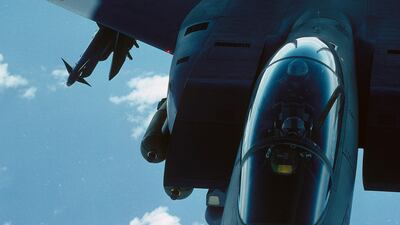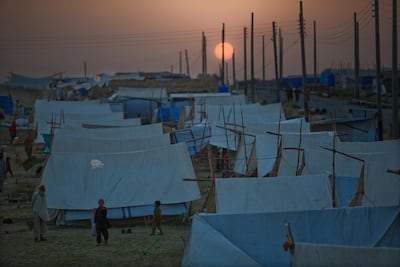Mohammed Hanif's critically acclaimed, Booker Prize-longlisted debut novel A Case of Exploding Mangoes managed to be both a riotous thriller and a merciless political satire. Running like a red thread through its cat's-cradle makeup of plot arcs and narrative tangents, key exploits and attendant conspiracy theories, was one main strand concerning the mysterious plane crash that killed Pakistan's military dictator General Zia-ul-Haq.
Ten years after that brilliantly exuberant first novel – and seven years on from Hanif's admirable but messy second, Our Lady of Alice Bhatti – comes a third, Red Birds, which again takes shape from a crashed plane.
General Zia did not walk from the wreckage of his Hercules C130, but at the start of Hanif's new book, Major Ellie emerges unscathed from what remains of his F15 Strike Eagle. What's more, the American pilot finds sanctuary and acquires a whole new perspective in the place he was ordered to blow up, and among the people he was instructed to kill.
The novel opens with Ellie lost in the desert in a country which may or may not be his creator’s native Pakistan. While battling hunger, dehydration and delirium, Ellie explains how he wound up in this situation. After years spent coasting in his military career, his superior officer presented him with an opportunity to prove himself. His mission: to “wipe out a bit of Earth” containing an enemy camp. Instead, he crash landed in an area with no sign of life.
But civilisation of a sort is not so far away. Hanif swaps Ellie for a new narrator, a teenager in the Camp called Momo. This self-styled “man of commerce” drives a UN Jeep and dreams of making a fortune.
He also hopes to be reunited with his missing older sibling, Bro Ali, who went to work for the Americans at their base, the Hangar, but never came back. The Hangar has since closed down but the Camp remains under attack. “They bomb us,” Momo says, “because they assume we are related to bad Arabs.”
Hanif chops and changes and brings in a third narrator – improbably, Momo’s dog. Mutt reveals that an unfortunate incident with an electricity pole “fried my brains and turned me into a teller of tales”.
More significantly, a recent accident with a ball has caused him to abandon his owner and the Camp, and has left him with a fractured leg and a broken heart.
Having introduced all three narrators, Hanif gets his anarchic show on the road – an impressive multivoiced performance that straddles bitter tragedy and pungent black comedy, grounded realism and flighty absurdity.
Inevitably, the three separate leading characters come together to interact with and impact on each other. After eight days of wandering in the wilderness, Ellie discovers an injured Mutt and later, an angry Momo.
Brought back to the Camp to recuperate, Ellie wins Momo’s trust by lying, telling him he was a pilot delivering humanitarian aid. Soon he is enticed into accompanying one man and his dog on another mission – one that involves storming the Hangar, rescuing Momo’s brother and exorcising several ghosts.
Red Birds thrums with rambunctious energy. Hanif's narrators are compelling forces, their wild accounts capable of gripping, moving and entertaining the reader. Ellie's sections display this best. One minute he is floundering in the desert or bewailing the breakdown of his marriage, the next he is relaying warped wisdom from the preposterous Cultural Sensitivity component of his survival course. "I wish I had taken that basic Arabic or Persian or modern Pashto course they were offering," he announces, "instead of the guerrilla gardening module that I went for."
Momo’s episodes are animated by his misplaced faith in his get-rich-quick schemes and his despair at his bickering parents. Then there are his sessions with Lady Flowerbody, the glamorous USAID consultant (or “visiting surveyor”) posted to the Camp to assess the psychological effects of war. “First they bomb us from the skies,” Momo explains, “then they work hard to cure our stress.”
Mutt’s sections are not shaggy dog stories but tales of woe about his harsh life mixed with objective commentary on the strange human behaviour going on around him. We accept Hanif’s surreal streak of employing a dog as a narrator, and find the trope all the more amusing when Mutt blithely references aspirins, Ray-Bans, Scotch tape, Vin Diesel and anthropomorphism. Less effective, though, are his corny curses (“woof off” and “woof this Camp”).
Equally jarring are elements of Momo's narration. His sulks, snarky asides and succession of gonnas and wannas underpin his teenage credentials, but there are times when it is hard to believe he is a 15-year-old living in the back of beyond: "Look at those sunglasses," he says, taking stock of Ellie. "Look at that pulled-down, depressed crocodile face that he has acquired after pulling a million negative Gs."
But then if dogs can talk like humans in Hanif’s fictive world, then presumably adolescents can talk like adults. Anything goes here and everything matters, whether in the desert, the Hangar or the Camp. This last, lawless, desperate setting is the stage for the novel’s strongest scenes and the source of the narrative’s power and pathos.
At one point, Ellie tries to tell Lady Flowerbody that they complement each other. “If I didn’t obliterate cities, how would you get to set up refugee camps? Where would all the world’s empathy go?”
Such moments ram home that this is writing with guts, satire with bite.
______________________
Read more:
'Outclassed in Kuwait' tells of the vain search for a place in Kuwaiti society
WATCH: Thousands on hunt for a good read at world's biggest book sale
Anna Burns wins Booker Prize with Troubles tale Milkman
______________________


